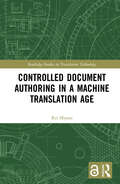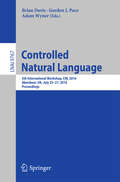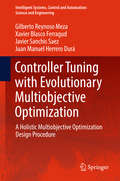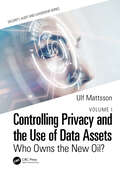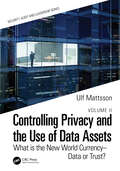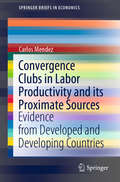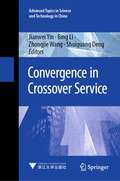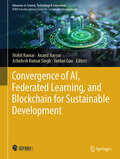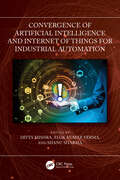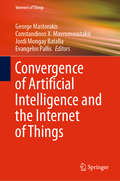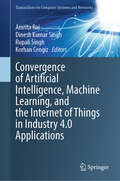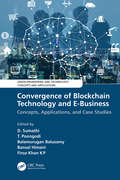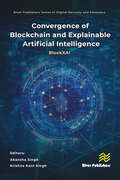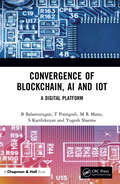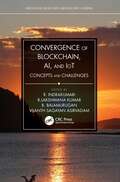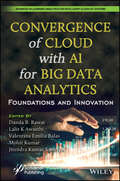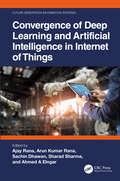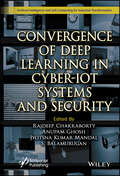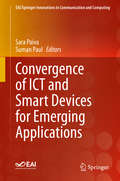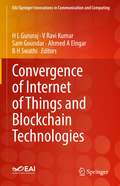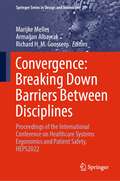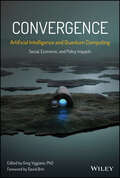- Table View
- List View
Controlled Document Authoring in a Machine Translation Age (Routledge Studies in Translation Technology and Techno-Humanities)
by Rei MiyataThis book explains the concept, framework, implementation, and evaluation of controlled document authoring in this age of translation technologies. Machine translation (MT) is routinely used in many situations, by companies, governments, and individuals. Despite recent advances, MT tools are still known to be imperfect, sometimes producing critical errors. To enhance the performance of MT, researchers and language practitioners have developed controlled languages that impose restrictions on the form or length of the source-language text. However, a fundamental, persisting problem is that both current MT systems and controlled languages deal only with the sentence as the unit of processing. To be effective, controlled languages must be contextualised at the document level, consequently enabling MT to generate outputs appropriate for their functional context within the target document. With a specific focus on Japanese municipal documents, this book establishes a framework for controlled document authoring by integrating various research strands including document formalisation, controlled language, and terminology management. It then presents the development and evaluation of an authoring support system, MuTUAL, that is designed to help non-professional writers create well-organised documents that are both readable and translatable. The book provides useful insights for researchers and practitioners interested in translation technology, technical writing, and natural language processing applications.
Controlled Natural Language: 5th International Workshop, CNL 2016, Aberdeen, UK, July 25-27, 2016, Proceedings (Lecture Notes in Computer Science #9767)
by Brian Davis Gordon J. Pace Adam WynerThis book constitutes the refereed proceedings of the 5th International Workshop on Controlled Natural Language, CNL 2016, held in Aberdeen, UK, in July 2016. The 11 full papers presented were carefully reviewed and selected from 15 submissions. The topics range from natural languages which are controlled, to controlled languages with a natural language flavour; and from more theoretical results to interfaces, reasoning engines and real-life applications of CNLs.
Controller Tuning with Evolutionary Multiobjective Optimization: A Holistic Multiobjective Optimization Design Procedure (Intelligent Systems, Control and Automation: Science and Engineering #85)
by Gilberto Reynoso Meza Xavier Blasco Ferragud Javier Sanchis Saez Juan Manuel Herrero DuráThis book is devoted to Multiobjective Optimization Design (MOOD) procedures for controller tuning applications, by means of Evolutionary Multiobjective Optimization (EMO). It presents developments in tools, procedures and guidelines to facilitate this process, covering the three fundamental steps in the procedure: problem definition, optimization and decision-making. The book is divided into four parts. The first part, Fundamentals, focuses on the necessary theoretical background and provides specific tools for practitioners. The second part, Basics, examines a range of basic examples regarding the MOOD procedure for controller tuning, while the third part, Benchmarking, demonstrates how the MOOD procedure can be employed in several control engineering problems. The fourth part, Applications, is dedicated to implementing the MOOD procedure for controller tuning in real processes.
Controlling Privacy and the Use of Data Assets - Volume 1: Who Owns the New Oil? (Security, Audit and Leadership Series)
by Ulf Mattsson"Ulf Mattsson leverages his decades of experience as a CTO and security expert to show how companies can achieve data compliance without sacrificing operability." Jim Ambrosini, CISSP, CRISC, Cybersecurity Consultant and Virtual CISO "Ulf Mattsson lays out not just the rationale for accountable data governance, he provides clear strategies and tactics that every business leader should know and put into practice. As individuals, citizens and employees, we should all take heart that following his sound thinking can provide us all with a better future." Richard Purcell, CEO Corporate Privacy Group and former Microsoft Chief Privacy Officer Many security experts excel at working with traditional technologies but fall apart in utilizing newer data privacy techniques to balance compliance requirements and the business utility of data. This book will help readers grow out of a siloed mentality and into an enterprise risk management approach to regulatory compliance and technical roles, including technical data privacy and security issues. The book uses practical lessons learned in applying real-life concepts and tools to help security leaders and their teams craft and implement strategies. These projects deal with a variety of use cases and data types. A common goal is to find the right balance between compliance, privacy requirements, and the business utility of data. This book reviews how new and old privacy-preserving techniques can provide practical protection for data in transit, use, and rest. It positions techniques like pseudonymization, anonymization, tokenization, homomorphic encryption, dynamic masking, and more. Topics include Trends and Evolution Best Practices, Roadmap, and Vision Zero Trust Architecture Applications, Privacy by Design, and APIs Machine Learning and Analytics Secure Multiparty Computing Blockchain and Data Lineage Hybrid Cloud, CASB, and SASE HSM, TPM, and Trusted Execution Environments Internet of Things Quantum Computing And much more!
Controlling Privacy and the Use of Data Assets - Volume 2: What is the New World Currency – Data or Trust? (Security, Audit and Leadership Series)
by Ulf MattssonThe book will review how new and old privacy-preserving techniques can provide practical protection for data in transit, use, and rest. We will position techniques like Data Integrity and Ledger and will provide practical lessons in Data Integrity, Trust, and data’s business utility. Based on a good understanding of new and old technologies, emerging trends, and a broad experience from many projects in this domain, this book will provide a unique context about the WHY (requirements and drivers), WHAT (what to do), and HOW (how to implement), as well as reviewing the current state and major forces representing challenges or driving change, what you should be trying to achieve and how you can do it, including discussions of different options. We will also discuss WHERE (in systems) and WHEN (roadmap). Unlike other general or academic texts, this book is being written to offer practical general advice, outline actionable strategies, and include templates for immediate use. It contains diagrams needed to describe the topics and Use Cases and presents current real-world issues and technological mitigation strategies. The inclusion of the risks to both owners and custodians provides a strong case for why people should care. This book reflects the perspective of a Chief Technology Officer (CTO) and Chief Security Strategist (CSS). The Author has worked in and with startups and some of the largest organizations in the world, and this book is intended for board members, senior decision-makers, and global government policy officials—CISOs, CSOs, CPOs, CTOs, auditors, consultants, investors, and other people interested in data privacy and security. The Author also embeds a business perspective, answering the question of why this an important topic for the board, audit committee, and senior management regarding achieving business objectives, strategies, and goals and applying the risk appetite and tolerance. The focus is on Technical Visionary Leaders, including CTO, Chief Data Officer, Chief Privacy Officer, EVP/SVP/VP of Technology, Analytics, Data Architect, Chief Information Officer, EVP/SVP/VP of I.T., Chief Information Security Officer (CISO), Chief Risk Officer, Chief Compliance Officer, Chief Security Officer (CSO), EVP/SVP/VP of Security, Risk Compliance, and Governance. It can also be interesting reading for privacy regulators, especially those in developed nations with specialist privacy oversight agencies (government departments) across their jurisdictions (e.g., federal and state levels).
Controlling – Aktuelle Entwicklungen und Herausforderungen: Digitalisierung, Nachhaltigkeit und Spezialaspekte
by Stefan Mayr Birgit Feldbauer-DurstmüllerDie in diesem Band vorgelegten Beiträge verorten das Controlling im Spannungsfeld von Digitalisierung und Nachhaltigkeit aus konzeptioneller und empirischer Perspektive: In Anbetracht aktueller weitreichender Veränderungen sieht sich das Controlling mit einer Vielzahl von Anwendungsfeldern konfrontiert, die nicht nur die Controller-Rolle maßgeblich verändern, sondern auch Familienunternehmen und Klein- und Mittelunternehmen vor besondere Herausforderungen stellen. Dieser vielschichtigen Problemlage wird der Band mit einem klaren Wissenschafts- und Praxisbezug gerecht: Empirische Befunde qualitativer und quantitativer Art werden theoretisch fundiert dargelegt sowie durch praktische Beispiele, Fallstudien und Praxisempfehlungen ergänzt.
Convection in Ferro-Nanofluids: Physical Mechanisms, Flow Patterns, and Heat Transfer (Advances in Mechanics and Mathematics #40)
by Aleksandra A. Bozhko Sergey A. SuslovThis book covers the experimental and theoretical study of convection in non-isothermal ferro-nanofluids (FNFs). Since FNFs are not transparent and magnetic fields are very sensitive to the shape of the boundary between magnetic and nonmagnetic media, special flow visualization techniques based on the use of thermo-sensitive liquid crystal films, infrared cameras, as well as local and integral temperature sensors are discussed in the book. This book considers several major configurations of convective chambers and the applied magnetic field. For each of them, the stability boundaries are determined theoretically and experimentally. The physical types of dominant instabilities and the characteristics of their interactions are subsequently established using linear and weakly non-linear hydrodynamic stability analyses and elements of bifurcation theory. The book also discusses the potential of using magnetically controlled ferro-nanofluids as a heat carrier in situations where heat removal by natural convection is not possible due to the lack of gravity (orbital stations) or extreme confinement (microelectronics). Researchers and practitioners working in the areas of fluid mechanics, hydrodynamic stability, and heat and mass transfer will benefit from this book.
Convergence Clubs in Labor Productivity and its Proximate Sources: Evidence from Developed and Developing Countries (SpringerBriefs in Economics)
by Carlos MendezTesting for economic convergence across countries has been a central issue in the literature of economic growth and development. This book introduces a modern framework to study the cross-country convergence dynamics in labor productivity and its proximate sources: capital accumulation and aggregate efficiency. In particular, recent convergence dynamics of developed as well as developing countries are evaluated through the lens of a non-linear dynamic factor model and a clustering algorithm for panel data. This framework allows us to examine key economic phenomena such as technological heterogeneity and multiple equilibria. In this context, the book provides a succinct review of the recent club convergence literature, a comparative view of developed and developing countries, and a tutorial on how to implement the club convergence framework in the statistical software Stata.
Convergence in Crossover Service (Advanced Topics in Science and Technology in China #68)
by Bing Li Zhongjie Wang Jianwei Yin Shuiguang DengConvergence in crossover service explores the crossover phenomenon, crossover services and the convergence issues that arise in typical crossover scenarios. Unlike traditional service integration, crossover services need to realize multidimensional convergence of pattern, design, run-time environment, quality, and value. This book creatively proposes a framework of crossover service pattern modeling, simulation, evaluation, and convergence to achieve quantitative calculation and analysis of crossover service patterns. Also, this book provides a requirements convergence modeling and analysis framework to support crossover services requirements analysis and design. In the meantime, authors develop a new crossover service network architecture to achieve efficient governance of large-scale crossover services and construct an evaluation and optimization system for service quality and value. In the case of the rural Taobao scenario, the theory and engineering methods presented in this book can provide better solutions for crossover convergence. This book is of great interest to researchers and academics wishing to see what crossover services are, how they are implemented, and what benefits they bring.
Convergence of AI, Federated Learning, and Blockchain for Sustainable Development (Advances in Science, Technology & Innovation)
by Ashutosh Kumar Singh Anand Nayyar Mohit Kumar Yanhui GuoThis book provides current state of the art along with an insight of recent research trends and open issues, challenges, and future research direction for the academician, analyzer, researcher, writers, and authors. It also provides an opportunity to exchange knowledge in the field of IoT-enabled smart systems, Industry 4.0, networking, cyber-physical system, computing paradigms, and security with various tools and methods used for industry-oriented intelligent-based IoT applications. This advanced research edited book focuses on emerging and advancing technology-federated machine learning, blockchain, and artificial intelligence for real-time Internet of things (IoT) application to solve the real-world problems and make the life of human more conformable. The objective of the proposed book is to develop privacy preserving model for IoT applications and improve the security, privacy, reliability, and sustainability of the systems. This book motivates and enhances the quality of research and commercialization in the fields of AI, Industry 4.0, federated learning, and blockchain.
Convergence of Artificial Intelligence and Internet of Things for Industrial Automation
by Divya Mishra Shanu Sharma Alok Kumar VermaThis book begins by discussing the fundamentals of Artificial Intelligence, the Internet of Things, and their convergence. It then covers techniques, algorithms, and methods of analysing and processing data over the Artificial Intelligence of Things. The text elaborates on important concepts such as body sensor networks for safety in smart factories, smart energy management, smart robotic assistive systems, and service-oriented smart manufacturing.This book:• Discusses the security and privacy aspect of Artificial Intelligence of Things (AIoT) for smart real-time applications.• Explores challenges and issues of Artificial Intelligence and the Internet of Things in the field of industrial automation.• Includes case studies in Artificial Intelligence of Things (AIoT) convergence for data processing.• Showcases algorithms, techniques, and methods of analysing and processing data over the Artificial Intelligence of Things.• Highlights operation management using human-robot, smart maintenance, and autonomous production.It will serve as an ideal reference text for senior undergraduate, graduate students, and professionals in fields including industrial engineering, production engineering, manufacturing engineering, operations research, and computer engineering.
Convergence of Artificial Intelligence and the Internet of Things (Internet of Things)
by Constandinos X. Mavromoustakis George Mastorakis Jordi Mongay Batalla Evangelos PallisThis book gathers recent research work on emerging Artificial Intelligence (AI) methods for processing and storing data generated by cloud-based Internet of Things (IoT) infrastructures. Major topics covered include the analysis and development of AI-powered mechanisms in future IoT applications and architectures. Further, the book addresses new technological developments, current research trends, and industry needs. Presenting case studies, experience and evaluation reports, and best practices in utilizing AI applications in IoT networks, it strikes a good balance between theoretical and practical issues. It also provides technical/scientific information on various aspects of AI technologies, ranging from basic concepts to research grade material, including future directions. The book is intended for researchers, practitioners, engineers and scientists involved in the design and development of protocols and AI applications for IoT-related devices. As the book covers a wide range of mobile applications and scenarios where IoT technologies can be applied, it also offers an essential introduction to the field.
Convergence of Artificial Intelligence, Machine Learning, and the Internet of Things in Industry 4.0 Applications (Transactions on Computer Systems and Networks)
by Amrita Rai Dinesh Kumar Singh Rupali Singh Korhan Cengi̇zThe book offers valuable insights into research related to Industry 4.0 applications that utilize artificial intelligence (AI), machine learning (ML), and the Industrial Internet of Things (IIoT). Industry 4.0, also known as the Fourth Industrial Revolution, includes disruptive technologies such as the Internet of Things (IoT), robotics, virtual reality (VR), VLSI architecture, and AI, all of which are transforming modern society and manufacturing practices. This book addresses various aspects of smart industrial application design strategies and their effects on next-generation systems, including quantum computing, edge computing, IoT, cybersecurity, nano-communications, and robotic automation. The application of AI, machine learning techniques, and IoT is anticipated to improve the performance of automated and controlled systems. Intended as a resource for academics, researchers, and professionals in the fields of AI and ML, the content also explores their applications within the industrial revolution and the influence of VLSI on the global market. Additionally, the book serves as a reference for developing sustainable engineering solutions to address various global industrial challenges.
Convergence of Blockchain Technology and E-Business: Concepts, Applications, and Case Studies (Green Engineering and Technology)
by D. Sumathi; T. Poongodi; Balamurugan Balusamy; Bansal Himani; Firoz Khan K PThe purpose of this edited book is to provide the relevant technologies and case studies in a concise format that will simplify and streamline the processing of blockchain. The goal is for the contents of this book to change the way business transformations are conducting in economic and social systems. The book examines blockchain technology, the transaction attributes, and its footprint in various fields. It offers fundamentals and terminologies used in blockchain, architecture, and various consensus mechanisms that can be deployed in areas such as healthcare, smart cities, and supply chain management. The book provides a widespread knowledge into the deployment of security countermeasures that can be implemented for a blockchain network and enables the reader to consider the management of business processes and the implementation process in detail. The book highlights the challenges and provides various e-business case studies of security countermeasures. The book serves researchers and businesses by providing a thorough understanding of the transformation process using blockchain technology.
Convergence of Blockchain and Explainable Artificial Intelligence: BlockXAI (River Publishers Series in Digital Security and Forensics)
by Krishna Kant Singh Akansha SinghExplainable AI (XAI) is an upcoming research field in the domain of machine learning. This book aims to provide a detailed description of the topics related to XAI and Blockchain. These two technologies can benefit each other, and the research outcomes will benefit society in multiple ways.Existing AI systems make decisions in a black box manner. Explainable AI delineates how an AI system arrived at a particular decision. It inspects the steps and models that are responsible for making a particular decision. It is an upcoming trend that aims at providing explanations to the AI decisions. Blockchain is emerging as an effective technique for XAI. It enables accessibility to digital ledgers amongst the various AI agents. The AI agents collaborate using consensus and decisions are saved on Blocks. These blocks can be traced back but cannot be changed. Thus, the combination of AI with blockchain provides transparency and visibility to all AI decisions. BlockXAI is also being widely used for improving data security and intelligence. The decisions made are consensus based and decentralized leading to highly efficient AI systems.This book also covers topics that present the convergence of Blockchain with explainable AI and will provide researchers, academics, and industry experts with a complete guide to BlockXAI.
Convergence of Blockchain and Internet of Things in Healthcare (Smart Engineering Systems: Design and Applications)
by Arun Kumar Rana, Vishnu Sharma, Ajay Rana, Maksud Alam and Suman Lata TripathiThe Internet of Things (IoT) and blockchain are two new technologies that combine elements in many ways. A system where the virtual and physical worlds interact is created by integrating pervasive computing, ubiquitous computing, communication technologies, sensing technologies, Internet Protocol, and embedded devices. A massive number of linked devices and vast amounts of data present new prospects for developing services that can directly benefit the economy, environment, society, and individual residents. Due to the size of IoT and insufficient data security, security breaches may have a huge impact and negative effects. IoT not only connects gadgets but also people and other entities, leaving every IoT component open to a wide variety of assaults. The implementation and application of IoT and blockchain technology in actual scientific, biomedical, and data applications are covered in this book. The book highlights important advancements in health science research and development by applying the distinctive capabilities inherent to distributed ledger systems. Each chapter describes the current uses of blockchain in real-world data collection, medicine development, device tracking, and more meaningful patient interaction. All of these are used to create opportunities for expanding health science research. This paradigm change is studied from the perspectives of pharmaceutical executives, biotechnology entrepreneurs, regulatory bodies, ethical review boards, and blockchain developers.Key Features: Provides a foundation for the implementation process of blockchain and IoT devices based on healthcare-related technology Image processing and IoT device researchers can correlate their work with other requirements of advanced technology in the healthcare domain Conveys the latest technology, including artificial intelligence and machine learning, in healthcare-related technology Useful for the researcher to explore new things like security, cryptography, and privacy in healthcare related technology Tailored for people who want to start in healthcare-related technology with blockchain and IoT This book is primarily for senior undergraduates, graduate students, and academic researchers in the fields of electrical engineering, electronics and communication engineering, computer science and engineering, and biomedical engineering.
Convergence of Blockchain, AI and IoT: A Digital Platform
by T Poongodi Yogesh Sharma B Balamurugan M R Manu S KarthikeyanConvergence of Blockchain, AI and IoT: A Digital Platform discusses the convergence of three powerful technologies that play into the digital revolution and blur the lines between biological, digital, and physical objects. This book covers novel algorithms, solutions for addressing issues in applications, security, authentication, and privacy. Discusses innovative technological upgradation and significant challenges in the current era Gives an overview of clinical scientific research that enables smart diagnosis through artificial intelligence Provides an insight into how disruptive technology enabled with the self-running devices and protection mechanism is involved in an augmented reality with blockchain mechanism Talks about neural science being capable of enhancing deep brain waves to predict an overall improvement in human thoughts and behaviours Covers the digital currency mechanism in detail Enhances the knowledge of readers about smart contract and ledger mechanism with artificial intelligence and blockchain mechanism Targeted audiences range from those interested in the technical revolution of blockchain, big data and the Internet of Things, to research scholars and the professional market.
Convergence of Blockchain, AI, and IoT: Concepts and Challenges (Innovations in Big Data and Machine Learning)
by R. IndrakumariConvergence of Blockchain, AI, and IoT: Concepts and Challenges discusses the convergence of three powerful technologies that play into the digital revolution and blur the lines between biological, digital, and physical objects. This book covers novel algorithms, solutions for addressing issues in applications, security, authentication, and privacy. The book provides an overview of the clinical scientific research enabling smart diagnosis equipment through AI. It presents the role these technologies play in augmented reality and blockchain, covers digital currency managed with bitcoin, and discusses deep learning and how it can enhance human thoughts and behaviors. Targeted audiences range from those interested in the technical revolution of blockchain, big data and the Internet of Things, to research scholars and the professional market.
Convergence of Cloud with AI for Big Data Analytics: Foundations and Innovation (Advances in Learning Analytics for Intelligent Cloud-IoT Systems)
by Danda B. Rawat Valentina Emilia Balas Mohit Kumar Jitendra Kumar Samriya Lalit K AwasthiCONVERGENCE of CLOUD with AI for BIG DATA ANALYTICS This book covers the foundations and applications of cloud computing, AI, and Big Data and analyses their convergence for improved development and services. The 17 chapters of the book masterfully and comprehensively cover the intertwining concepts of artificial intelligence, cloud computing, and big data, all of which have recently emerged as the next-generation paradigms. There has been rigorous growth in their applications and the hybrid blend of AI Cloud and IoT (Ambient-intelligence technology) also relies on input from wireless devices. Despite the multitude of applications and advancements, there are still some limitations and challenges to overcome, such as security, latency, energy consumption, service allocation, healthcare services, network lifetime, etc. Convergence of Cloud with AI for Big Data Analytics: Foundations and Innovation details all these technologies and how they are related to state-of-the-art applications, and provides a comprehensive overview for readers interested in advanced technologies, identifying the challenges, proposed solutions, as well as how to enhance the framework. Audience Researchers and post-graduate students in computing as well as engineers and practitioners in software engineering, electrical engineers, data analysts, and cyber security professionals.
Convergence of Deep Learning and Artificial Intelligence in Internet of Things (Future Generation Information Systems)
by Ahmed A. Elngar Arun Kumar Rana Sharad Sharma Sachin Dhawan Ajay RanaThis book covers advances and applications of smart technologies including the Internet of Things (IoT), artificial intelligence, and deep learning in areas such as manufacturing, production, renewable energy, and healthcare. It also covers wearable and implantable biomedical devices for healthcare monitoring, smart surveillance, and monitoring applications such as the use of an autonomous drone for disaster management and rescue operations. It will serve as an ideal reference text for senior undergraduate, graduate students, and academic researchers in the areas such as electrical engineering, electronics and communications engineering, computer engineering, and information technology. • Covers concepts, theories, and applications of artificial intelligence and deep learning, from the perspective of the Internet of Things. • Discusses powers predictive analysis, predictive maintenance, and automated processes for making manufacturing plants more efficient, profitable, and safe. • Explores the importance of blockchain technology in the Internet of Things security issues. • Discusses key deep learning concepts including trust management, identity management, security threats, access control, and privacy. • Showcases the importance of intelligent algorithms for cloud-based Internet of Things applications. This text emphasizes the importance of innovation and improving the profitability of manufacturing plants using smart technologies such as artificial intelligence, deep learning, and the Internet of Things. It further discusses applications of smart technologies in diverse sectors such as agriculture, smart home, production, manufacturing, transport, and healthcare.
Convergence of Deep Learning in Cyber-IoT Systems and Security (Artificial Intelligence and Soft Computing for Industrial Transformation)
by Jyotsna Kumar Mandal S. Balamurugan Rajdeep Chakraborty Anupam GhoshCONVERGENCE OF DEEP LEARNING IN CYBER-IOT SYSTEMS AND SECURITY In-depth analysis of Deep Learning-based cyber-IoT systems and security which will be the industry leader for the next ten years. The main goal of this book is to bring to the fore unconventional cryptographic methods to provide cyber security, including cyber-physical system security and IoT security through deep learning techniques and analytics with the study of all these systems. This book provides innovative solutions and implementation of deep learning-based models in cyber-IoT systems, as well as the exposed security issues in these systems. The 20 chapters are organized into four parts. Part I gives the various approaches that have evolved from machine learning to deep learning. Part II presents many innovative solutions, algorithms, models, and implementations based on deep learning. Part III covers security and safety aspects with deep learning. Part IV details cyber-physical systems as well as a discussion on the security and threats in cyber-physical systems with probable solutions. Audience Researchers and industry engineers in computer science, information technology, electronics and communication, cybersecurity and cryptography.
Convergence of ICT and Smart Devices for Emerging Applications (EAI/Springer Innovations in Communication and Computing)
by Sara Paiva Suman PaulThis book focuses on recent topics related to the convergence of information and communication technologies (ICT) and computing with smart devices. Domain areas of application include social, industrial, business development, and day to day life aspects. This book presents chapters related to the aforementioned topics including case studies showcasing future technological trends and challenges. Topics social inclusion solutions and social changes; smart devices and applications for day to day life; smart IoT and applications; and smart cities solutions. The book is applicable to researchers, students, professionals, and professors in a wide range of fields.Focuses on recent developments in ICT and smart devices that pose a clear benefit for users;Presents applications of ICT in education, health, electronics, communication, networking, computing, tourism, transportation;Appeals to researchers, academics, and professionals in a cross section of disciplines.
Convergence of Internet of Things and Blockchain Technologies (EAI/Springer Innovations in Communication and Computing)
by Sam Goundar H L Gururaj V Ravi Kumar Ahmed A Elngar B H SwathiThis book presents chapters from diverse range of authors on different aspects of how Blockchain and IoT are converging and the impacts of these developments. The book provides an extensive cross-sectional and multi-disciplinary look into this trend and how it affects artificial intelligence, cyber-physical systems, and robotics with a look at applications in aerospace, agriculture, automotive, critical infrastructures, healthcare, manufacturing, retail, smart transport systems, smart cities, and smart healthcare. Cases include the impact of Blockchain for IoT Security; decentralized access control systems in IoT; Blockchain architecture for scalable access management in IoT; smart and sustainable IoT applications incorporating Blockchain, and more. The book presents contributions from international academics, researchers, and practitioners from diverse perspectives.Presents how Blockchain and IoT are converging and the impacts of these developments on technology and its application;Discusses IoT and Blockchain from cross-sectional and multi-disciplinary perspectives;Includes contributions from researchers, academics, and professionals from around the world.
Convergence: Proceedings of the International Conference on Healthcare Systems Ergonomics and Patient Safety, HEPS2022 (Springer Series in Design and Innovation #30)
by Richard H. M. Goossens Marijke Melles Armaĝan AlbayrakThis book presents the proceedings of the 7th conference Healthcare Systems Ergonomics and Patient Safety (HEPS), held in Delft, The Netherlands on November 2-4, 2022, which was endorsed by the International Ergonomics Association (IEA). Contributions focus on the integration of knowledge, methods, and expertise from the disciplines of Human Factors/Ergonomics and of Medicine and Health in order to contribute to a safe and humane, high-quality healthcare system. Through breaking down the barriers between disciplines, they foster a framework of scientific knowledge, expertise and best practices to create the future of health and healthcare. The proceedings include papers from researchers and practitioners, scientists and physicians, institutional leaders, managers and policy makers that contribute to constructing the Human Factors and Ergonomics approach across a variety of methodologies, domains and productive sectors.
Convergence: Social, Economic, and Policy Impacts
by Greg ViggianoPrepare for the coming convergence of AI and quantum computing A collection of essays from 20 renowned, international authors working in industry, academia, and government, Convergence: Artificial Intelligence and Quantum Computing explains the impending convergence of artificial intelligence and quantum computing. A diversity of viewpoints is presented, each offering their view of this coming watershed event. In the book, you&’ll discover that we&’re on the cusp of seeing the stuff of science fiction become reality, with huge implications for ripping up the existing social fabric, global economy, and current geopolitical order. Along with an incisive foreword by Hugo- and Nebula-award winning author David Brin, you&’ll also find: Explorations of the increasing pace of technological development Explanations of why seemingly unusual and surprising breakthroughs might be just around the corner Maps to navigate the potential minefields that await us as AI and quantum computing come togetherA fascinating and thought-provoking compilation of insights from some of the leading technological voices in the world, Convergence convincingly argues that we should prepare for a world in which very little will remain the same and shows us how to get ready.
